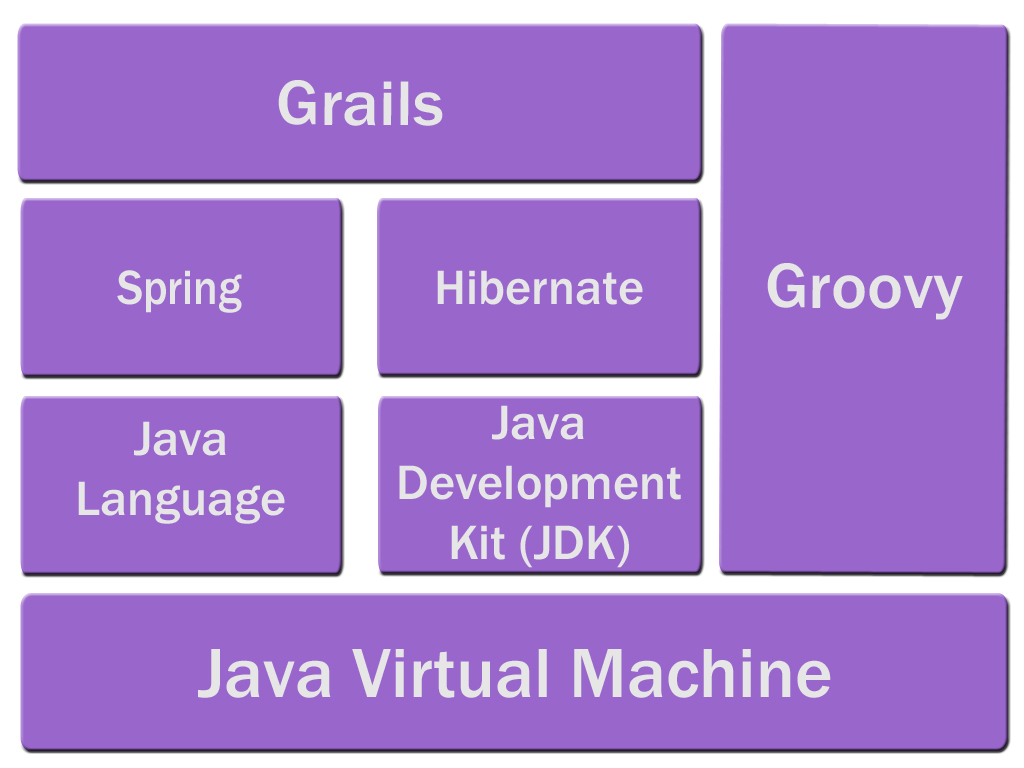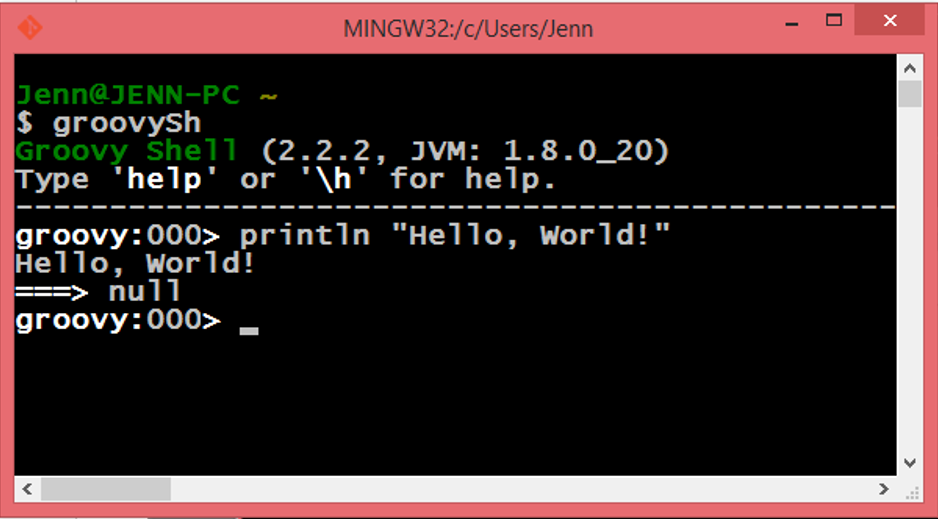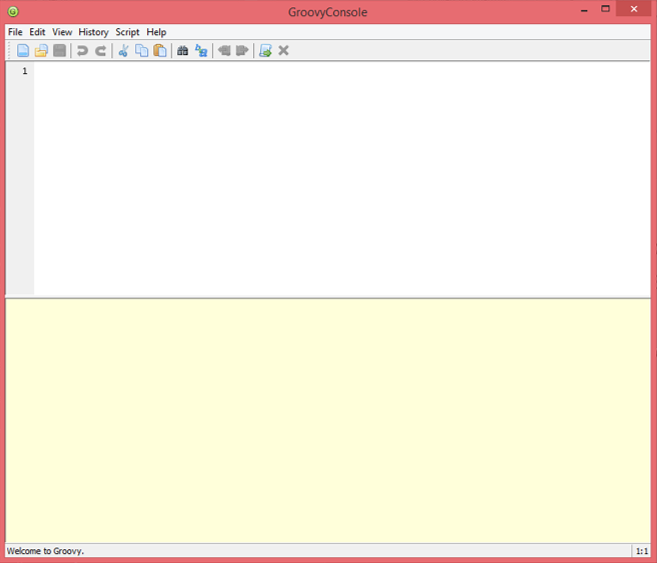Introduction to Groovy
October 3, 2015

 @jennstrater
@jennstrater
Current
About Me
Professional
-
 Senior Consultant - Object Partners
Senior Consultant - Object Partners
-
 Co-Founder - Gr8Ladies
Co-Founder - Gr8Ladies
About Me
Experience
 source: http://tjvantoll.com/2014/12/29/so-you-want-to-write-a-tech-book/
source: http://tjvantoll.com/2014/12/29/so-you-want-to-write-a-tech-book/
About Me
Minneapolis, MN

About YOU
- Students
- Professional Developers
- Java
- .NET
- PHP or Ruby
- JRuby, Scala, or Clojure
- Groovy
Agenda
- Background & Ecosystem
- Getting Started
- Concepts
- Data Types
- Collections/Loops
- Functions
- Closures
Agenda
- Object Oriented Programming (OOP)
- Scripting
- File Processing
- APIs

Groovy
- Dynamic, compiled language for the Java Virtual Machine(JVM).
- Interoperable with existing Java libraries
- Concise, easy to read code
- Used by many major companies including:
Open Source
Apache
To contribute: https://github.com/apache/incubator-groovy
The Groovy Ecosystem

When to use Groovy
- existing Java libraries
- developers know Java or another JVM language
- infrastructure to support JVMs
- quick prototyping
- scripting
- writing tests
When Not to use Groovy
- lots of legacy code in another language
- need 'bare metal' level performance
Getting Started
- Download Locally
- SDK Manager (formerly GVM)http://sdkman.io/
curl -s get.sdkman.io | bash
http://groovy-lang.org/download.html
Groovy Shell

Groovy Console

Web Console
Things to Remember
- There is more than one way to do almost anything.
- It's probably optional.
- semi-colons
- typing
- parenthesis around parameters
- return statements
- By default, the last command executed is what's returned.
Hello, World!
groovy>println "Hello, Open Source North!"
Hello, Open Source North!
===>nullData Types
- Optional Typing, NOT dynamic
- treated as objects
- int treated like Integer
int i = 10
println i.class.name
-> java.lang.Integer
Integer i = 20
println i.class.name
-> java.lang.Integerdef
when no type is specified or for a flexible type
def i = 10
println i * 2
-> 20
i = 'abc'
println i * 2
-> abcabcStrings
(examples in console)
- Single Quoted
- Double Quoted
- Multi-line
Collections
Lists
(examples in console)
- definition
- get/set values
- append
- multiply
List m = ['a', 'b', 2]
println m[2]
-> 2
m[2] = 3
println m
-> [a, b, 3]
m << 'c'
println m
-> [a, b, 3, c]
m.push(4)
-> [a, b, 3, c, 4]
m.pop()
-> 4List m = ['a', 'b', 2]
m.multiply(2)
-> ['a', 'b', 2, 'a', 'b', 2]
m * 2
-> ['a', 'b', 2, 'a', 'b', 2]
m + 2
-> ['a', 'b', 2, 2]Maps
(examples in console)
- definition
- get/set values
- get all keys/values
Map m = [val1: 'a', val2: 'b', val3: 2]
println m.val1
-> a
println m['val3']
-> 2
m.val4 = 3
println m
-> [val1:a, val2:b, val3: 2, val4: 3]
println m.keySet()
-> [val1, val2, val3, val4]
println m.values()
-> [a, b, 2, 3]
Ranges
println (1..10)
-> [1, 2, 3, 4, 5, 6, 7, 8, 9, 10]println (1..<10)
-> [1, 2, 3, 4, 5, 6, 7, 8, 9]Functions
Integer timesTwo(x) {
x + x
}- Flexible, familiar syntax
- Optional
- Parenthesis when calling functions
- Parameter typing
- return statements
println timesTwo(10)
-> 20
def result = timesTwo 10
println result
-> 20Closures
Code as Data
(to the console)
- definition
- calls
Closure c = { name, year = 2015 ->
println "Hello, $name $year!"
}
c.call('Open Source North')
-> "Hello, Open Source North 2015!"
c('Open Source North', 2016)
-> "Hello, Open Source North 2016"Loops and Special Functions
- Basic For Loop
- Each
- Collect
- Spread Dot
Basic Loops
List dl = []
for(Integer i = 1; i < 4; i++){
dl.add(i * 2)
}
println dl
-> [2, 4, 6]List dl = []
for(i in [1,2,3]) {
dl << i * 2
}
println dl
-> [2, 4, 6]Each
List sl = [1, 2, 3]
List dl = []
sl.each { it ->
dl << it * 2
}
println dl
-> [2, 4, 6]Collect
Map m = [va1: 1, var2: 2, var3: 3]
List dl = m.collect { key, value ->
value * 2
}
println dl
-> [2, 4, 6]Spread Dot
(1..3).multiply(2)-> [1, 2, 3, 1, 2, 3](1..3)*.multiply(2)-> [2, 4, 6]
Try It!
Print the sum of the numbers from 1 to 10
option 1:Integer answer = 0 for(i in [1,2,3,4,5,6,7,8,9,10]) { answer += i } println answeroption 2:Integer answer = 0 (1..10).each { answer = answer + it } println answerbonus answer:println (1..10).sum()
Groovy Truth
False values
- null
- Empty Set
- Empty String
- Zero
Equality
== verifies value
is verifies object identity
List numbers = [0,1,2,3]
numbers.each {
if(it) {
println it
}
}
-> 1
-> 2
-> 3Other Groovy Operators
- Ternary Operator
x ? return x : return 'something else'x ?: 'something else'myMap?.propertyA?.propertyBSearch
Map m = [val1: 2, val2: 4, val3: 6]
m.find { it.value % 2 == 0 && it.value % 3 != 0 }
-> val1=2
m.findAll {it.value % 2 == 0 && it.value % 3 != 0 }
-> [val1:2, val2:4]
Other List Methods
- Any
Map m = [val1: 2, val2: 4, val3: 6]
m.any { it.value % 2 == 0 }
-> truem.every { it.value % 3 == 0 }
-> falseObject Oriented Programming (OOP)
class Person {
String first
String last
}Person me = new Person(first: 'Jenn', last: 'Strater')
println me.first
println me.last
-- add String company to class --
me.company = 'Object Partners'
println me.properties
-> [class:class Person, first:Jenn, company:Object Partners, last:Strater]class Person {
String first
String last
String getFullName() {
this.first + ' ' + this.last
}
}
Person me = new Person(first: 'Jenn', last: 'Strater')
println me.fullName
-> 'Jenn Strater'Scripts
(save previous script as people.groovy)
groovy people.groovy
-> Jenn StraterScript Parsing
println doubledValue(10)
def doubledValue(x) {
x * 2
}File Processing
Creating and Writing to Files
def myFile = new File('foo.txt')
myFile.write 'Hello, \n'
myFile.append('Open Source North!')foo.txt
Hello,
Open Source North!Reading Files
def myFile = new File('foo.txt')
myFile.eachLine { line ->
def processedLine = line.replaceAll('Hello', 'Hi')
println processedLine
}
-> Hi,
-> Open Source North!APIs
(copy to console)
@Grab(group='org.codehaus.groovy.modules.http-builder', module='http-builder', version='0.7.1')
import groovyx.net.http.RESTClient
def http = new RESTClient("http://www.gr8ladies.org")
http.get(path: '/api/companies') { resp, reader ->
reader.sort { -it.percentageTotalWomen } // sort by percentage women in descending order
reader[0..4].each{ // only the first 5
if(it.totalEmployees) { // if the value of total employees is not 0 (to eliminate companies that didn't report that field)
println 'name:' + it.name
println 'country:' + it.country
println 'total employees: ' + it.totalEmployees
println 'total men: '+ it.totalMen
println 'total women: '+ it.totalWomen + '\n'
}
}
}
return null // don't print the entire result at the endAPIs
(copy to console)
@Grab(group='org.codehaus.groovy.modules.http-builder', module='http-builder', version='0.7.1')
import groovyx.net.http.RESTClient
def http = new RESTClient("http://api.icndb.com")
http.get(path: '/jokes/random/5', query: [exclude: 'explicit']) { resp, reader ->
reader.value.joke.each{
println it + '\n'
}
}Other Cool Groovy Things
- Regex
- MetaClass
- Groovy for Android
- Compile Static Annotation
Conclusions
- Groovy
- provides the benefits of the JVM platform
- adds features to enhance productivity over Java
- is similar to other languages such as Ruby and Python
References
- Groovy in Action, 2nd Edition
- groovy-lang.org
- Practical Groovy Free e-book
Questions?
jenn@gr8ladies.org









